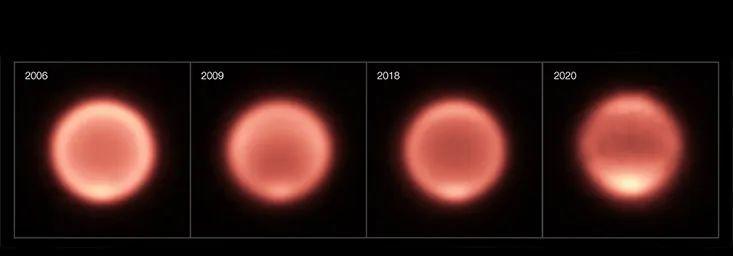
Credit: ESO/M. Roman, NAOJ/Subaru/COMICS
An international team of astronomers, using the Very Large Telescope (VLT) of the European Southern Observatory, tracked the temperature of Neptune's atmosphere over a 17-year period, and they found that neptune's global temperature dropped dramatically, followed by a sharp warming at Neptune's south pole.
Neptune has an orbital period of 165 Earth years and a rotation period of 16 hours. Because Neptune's axis inclination is 28.3 degrees, similar to Earth's 23.4 degrees and Mars' 25.2 degrees, Neptune also has obvious seasonal variations, and due to its long orbital cycle, a season lasts more than 40 years.
(Note: The reel inclination is the angle at which the axis of rotation is inclined relative to the plane of the track, also known as the inclination angle or axis intersection angle.) In astronomy , it is expressed and measured in terms of the angle between the axis of rotation and the straight line that passes through the center point of the planet and is perpendicular to the plane of the orbit. )
Credit: ESO/P. Weilbacher (AIP)/NASA, ESA, and M.H. Wong and J. Tollefson (UC Berkeley)
Neptune's southern hemisphere has been in summer since 2005, and astronomers want to see how the temperature changes after Neptune's summer solstice. Astronomers took nearly 100 thermal infrared images of Neptune over a 17-year period and found that between 2003 and 2018, Neptune's global average temperature dropped by 8 degrees, while the South Pole warmed sharply between 2018 and 2020, with temperatures rising 11 degrees.
Because Neptune is far away from us, and the current observation data is limited, astronomers do not know what caused this, it may be a change in the chemical composition of Neptune's stratosphere, or a random weather pattern, or even the influence of the solar cycle, and it is hoped that more observational data will be used to explain this phenomenon in the future.
reference:
https://www.eso.org/public/news/eso2206/